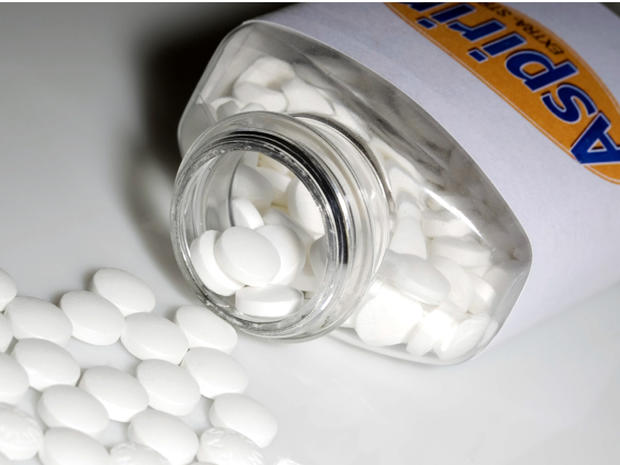Daily aspirin protects against deadly cancer, studies suggest
(CBS News) Many doctors recommend that patients take a daily dose of aspirin to reduce their risk for a future heart attack or stroke. Now three new studies suggest taking the cheap powdery pill every day can also reduce a person's risk for cancer, or prevent the disease from getting worse in patients who already have it.
PICTURES: Cancer: 25 Deadliest States
The studies, all led by Professor Peter M. Rothwell, a professor of clinical neurology at the University of Oxford in the U.K. are published in the March 20 issue of The Lancet and The Lancet Oncology.
For one of the studies, Rothwell and his colleagues reviewed data from 51 earlier trials that primarily looked at the effect daily aspirin use had on heart attack prevention. After reviewing the data, the researchers found people who took aspirin daily had a 15 percent lower risk of dying from cancer, and the risk reduction climbed to 37 percent for people who took aspirin daily for 5 years or more.
Men and women were about 25 percent less likely to develop cancer in the first place if they took aspirin daily for three years or longer.
The second study examined whether aspirin would stall the spread of cancer, known as metastasis. Researchers looked at five earlier trials in which people took a daily dose of aspirin and found that aspirin-takers had a 36 percent lower chance of having their cancer spread. Specifically, colon cancer patients had a 74 percent lower risk of having their cancer spread to other organs if they took aspirin daily. Aspirin also was tied to a 46 percent lower risk for colon, lung and prostate cancers and an 18 percent lower risk for bladder and kidney cancer.
"These findings provide the first proof in man that aspirin prevents distant cancer metastasis," the authors wrote. "That aspirin prevents metastasis at least partly accounts for the reduced cancer mortality recently reported in trials of aspirin."
The third study also looked at if aspirin could impact cancer's spread, but this time researchers reviewed observational case studies, because those results can often be gleaned quickly, rather than waiting 10-20 years for follow-ups from a randomized clinical trial. This study too found a reduced risk for developing colon cancer - about 38 percent lower - and found similar matches in risk for esophageal, stomach and breast cancer.
"In terms of prevention, anyone with a family history would be sensible to take aspirin," Rothwell told The New York Times.
These new studies are not the only ones to find aspirin's protective benefit against cancer. Previous researchshould taking aspirin as little as once a month curbed their pancreatic cancer risk, while another study found people genetically predisposed to colon cancer cut their risk through daily aspirin.
But aspirin does carry risks for some people, including a greater likelihood of suffering internal bleeding in the stomach and brain for some . People with any bleeding disorders or history of ulcers, asthma, or heart failure face this risk, according to the Mayo Clinic.
Do the cancer prevention benefits outweigh the risks?
In an accompanying editorial in the same issue of The Lancet, Dr. Andrew T. Chan and Dr. Nancy R. Cook, professors at Harvard Medical School in Boston, said, "Despite a convincing case that the vascular and anticancer benefits of aspirin outweigh the harms of major extracranial bleeding, these analyses do not account for less serious adverse effects on quality of life, such as less severe bleeding."
Other experts were equally as cautious.
"Any decision about treatment should be made on an individual basis in consultation with your health care professional," Dr. Eric Jacobs, strategic director of pharmacoepidemiology for the American Cancer Society, told WebMD. "Even low-dose aspirin can substantially increase the risk of serious gastrointestinal bleeding."
Also, questions remain about what happens if patients stop taking aspirin. A study last summer found that people who take aspirin daily but stop after a period of time are 60 percent more likely to suffer a heart attack within a year, HealthPop reported.
The National Institutes of Health has more on aspirin.

